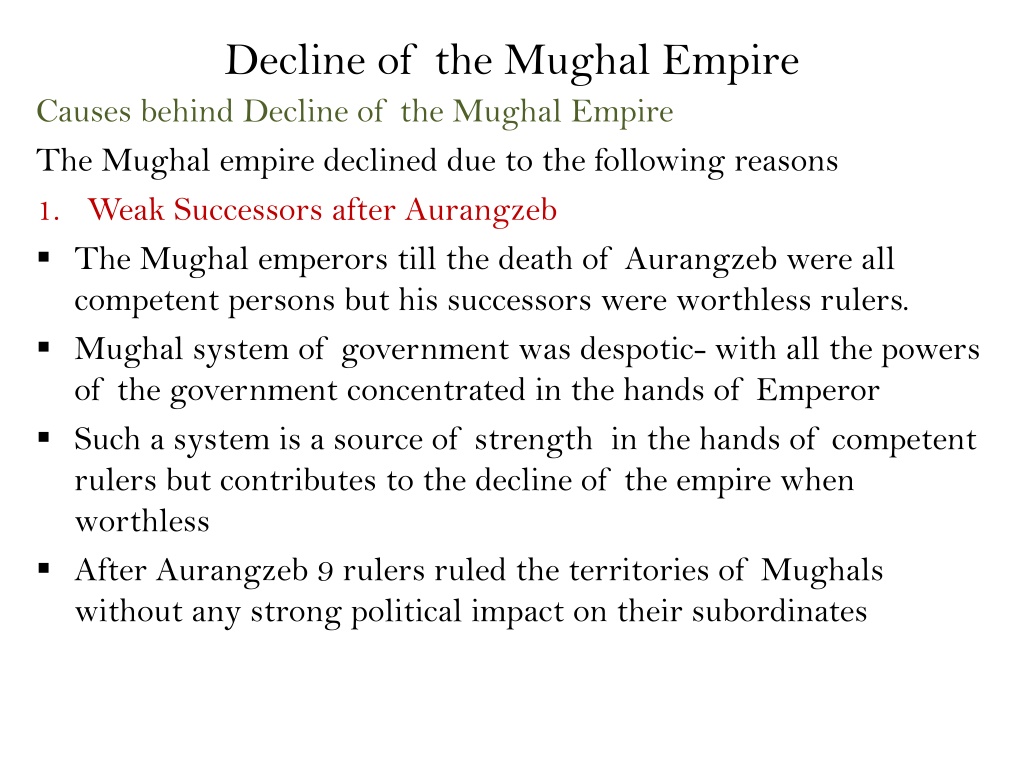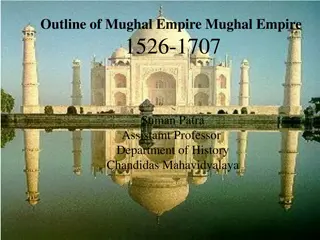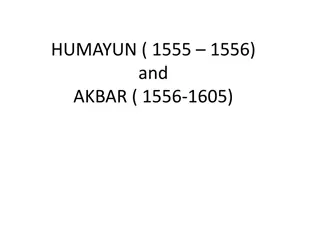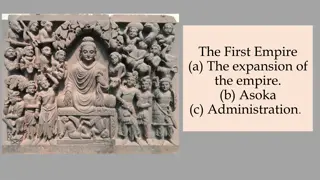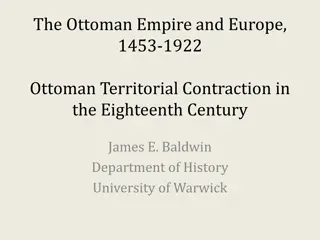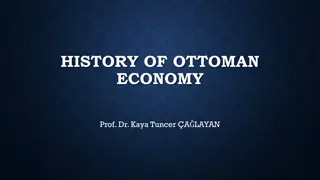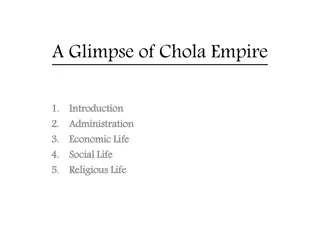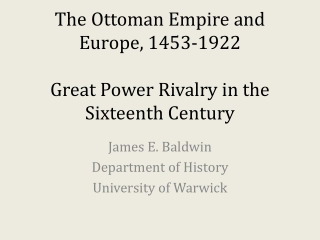Causes Behind the Decline of the Mughal Empire
The decline of the Mughal Empire was influenced by weak successors after Aurangzeb, degeneration of Mughal nobility, inefficiency of the army, economic bankruptcy, foreign invasions, wars of succession, and court factions. The empire faced challenges such as incompetent rulers, weakened military, financial crises, foreign invasions, internal power struggles, and interference from court factions.
Download Presentation

Please find below an Image/Link to download the presentation.
The content on the website is provided AS IS for your information and personal use only. It may not be sold, licensed, or shared on other websites without obtaining consent from the author. Download presentation by click this link. If you encounter any issues during the download, it is possible that the publisher has removed the file from their server.
E N D
Presentation Transcript
Decline of the Mughal Empire Causes behind Decline of the Mughal Empire The Mughal empire declined due to the following reasons 1. Weak Successors after Aurangzeb The Mughal emperors till the death of Aurangzeb were all competent persons but his successors were worthless rulers. Mughal system of government was despotic- with all the powers of the government concentrated in the hands of Emperor Such a system is a source of strength in the hands of competent rulers but contributes to the decline of the empire when worthless After Aurangzeb 9 rulers ruled the territories of Mughals without any strong political impact on their subordinates
2. Degeneration of Mughal Nobility Before 1707 nobles greatly contributed to the consolidation of Mughal Empire With the decline of Mughal rulers also reflected in the deterioration set in the Mughal Nobility also. Sarkar writes To the thoughtful students of Mughal history nothing is more stricking than the decline of peerage 3. Inefficiency of the Army The weakening of the Moghul army had became apparent even in the time of Shah Jahan- it failed to retake Kandahar from the Persians in spite of three expeditions. The method of payment to troops through Mansabdhari proved ineffective because state could not have direct control over the troops. Towards the end of the 17thcentury mansabdars became treasonable with the enemy- and could not give support to emperor even at the time of crisis and invasion
4. Economic Bankruptcy The Equitable share of production and tax collection deteriorated in the hands of Akbar successors. The state share (tax) was raised to one and half of the produce in the time of Shah Jahan and it made the condition of peasantry very bad. Tax collected wasted on magnificence of court and costly building. War of Aurangzeb also exhausted the treasury. Constant and costly wars depleted the royal treasury. 5. Foreign Invasion Nadir Shah of Persia attacked India in 1739-defeated Mohammed Shah took away booty worth about 70 crores of rupees including the famous Peacock throne and Kohinoor Diamond North- West Frontier policy of the Moghuls was failure they could not check invasion from that direction. After him Ahmed Shah Abdali(1748-1764) of Afghanistan attacked India and further weekend the empire.
6. Wars of Succession o There was no law of succession among the Mughals o The throne belongs to the successful throne o There was a war of succession almost after the death of every Mughul emperor o These become more frequent after the death of Aurangzeb 7. Court Factions There were two principal faction sin Mughal court. 1. Turani or Central Asian camp consisted of Sunni Muslims. 2. Persian Nobles who were mostly Shias They conspired to place or displace kings that suited them These factions proved tremendously detrimental for the competences and integrity of the Mogul empire
8. Impact of Reformers In Mahrastra Ram Das emphasized the importance of Maharastra Dharma and political sovereignty.- he advocated the religion could be protected by power only. By these assertions Shivaji was encouraged to wage war against Mughals In Punjab, the Sikh Gurus emphasised the need of attaining military and political power in order to protect their religion. These reformers encouraged a spirit of revolt and independence which started striking at the very roots of the Mughal empire. 9. Lack of Maritime Power The later Mughals doesn't show intention to develop sea power on their military- on the other hand it had became a smooth passage for the Europeans on the seas to establish their power in India. Hyder Ali said I am not afraid the English any where on the land, but I cannot dry up the seas 10. Reversal of Akbar Religious policy
